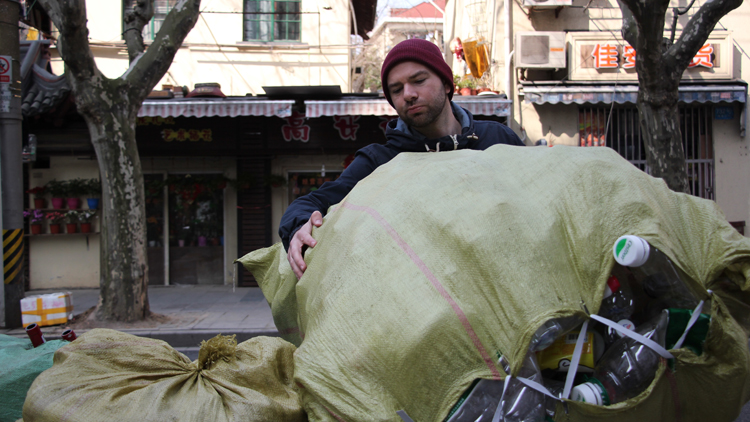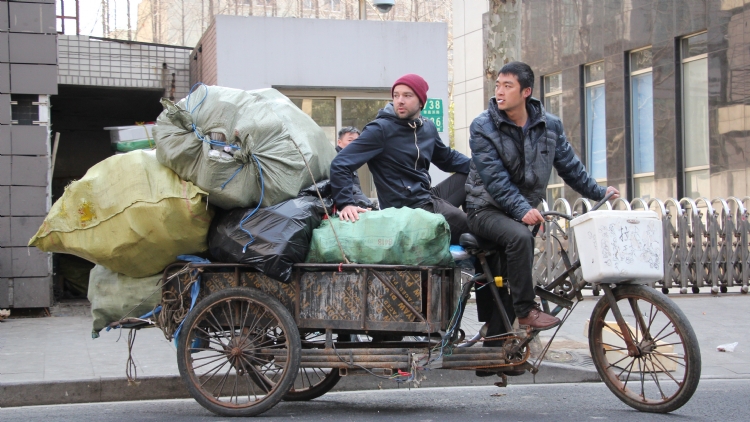Not far from the location of the old Longhua Airport, the setting for much of Empire of the Sun, I’m stood on a site that feels a bit like something out of a Ballardian dystopian future. In front of me stretches a corridor between high rises of rusting scrap metal, from coat-stands to cogs and wheel rims to woks. Just off to my left, behind a row of oil drums and a forklift, are towers of flattened cardboard and mountains of sacks stuffed with plastic bottles. A team of hard hat-wearing workers are unloading reels of heavy-duty cable from a truck just behind me, while across the road another truck is being piled high with planks of wood by a trio of men balancing precariously atop it.
This is one of Shanghai’s main recycling centres and there is junk everywhere you look. At least to my eyes. To the eyes of a recyclables trader, we're surrounded by potential profit. I’m here with sacks of aluminium cans and plastic bottles, which I’m queuing to offload from the back of a three-wheeled bike cart belonging to Mr Xia, a friendly recyclables trader who has agreed to have me along.
I met Mr Xia earlier in the day through his mother. While some recyclables traders cruise the streets, others take calls to collect waste from homes and businesses. And though she says she’ll recycle anything, Mr Xia’s mum has a line on a valuable source: the regular stream of rubbish served up by a restaurant and adjacent office block on a street in the southern reaches of the Former French Concession.
We all like to think that we’re
doing the right thing when we toss a used bottle into the correct bin, but few of us give much thought to what happens next. That’s largely thanks to the city-wide team of people for whom sorting out waste is a livelihood.

We do the plastic bottles first (for some reason dominated by Coke Zeros), emptying them of any leftover contents as we go, though a peanut butter jar proves a tricky proposition. The bottles will be weighed to determine their value (six mao per jin), but the aluminium drinks cans are paid for per item (seven fen each) so once we’ve crammed a sack full of bottles we have to pick through and count out the cans. Mr Xia then ties up the full sacks with old USB cords and modem lines and we load them onto the back of his bike.
Once we’ve got a few sacks good to go, Mr Xia heads back in amid the bins behind the restaurant and re-emerges brandishing the top of a white polystyrene box. Ah – I think – this must be valuable, and I remark to Mr Xia about regularly seeing bikes piled sky high with polystyrene.
‘Maybe in previous years,’ he says.
‘The price has gone down quite a lot
this year, so you don’t see it so much
at the moment.’
Turns out what I thought was
a piece of white gold has a more
practical use: ‘This is for you to sit
on,’ chuckles Mr Xia’s mother. ‘You
can put this on top of the sacks
and ride on the back of his bike, it’s
pretty clean.’

As we head south toward Longhua
and join a growing train of three-wheeled
bikes en route to the depot,
Mr Xia tells me this isn’t actually his
proper job. He’s just helping out for a
bit, he says, working 6am-7pm days
while his father is back home in Anhui.
But when he’s not standing in for his
dad, he works in demolition.
While we wait in line to have our
hoard assessed and weighed at
the depot, Mr Xia admits that he
doesn’t make as much money from
the recyclables game, and it’s clear
he’d rather be knocking down walls.
He takes out his phone and shows
me a WeChat group comprised of
renovation company bosses. ‘We
clear out the apartments and then
these guys do them up however
you want,’ he says, flicking through
photos of fancy-looking flats
being rented out for upwards of
20,000RMB a month.
There’s a steady flow of bikes
arriving behind us, all loaded up
with various kinds of waste, and
their drivers all leave with a few
notes in hand, but I can understand
his preference for demolition.
And presumably, when it comes
to throwing away the unwanted
furniture and other objects from the
old apartments, he knows just what
to do with them.
